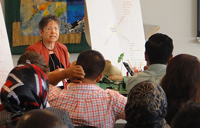
What will an eco-village on the York University campus look like? That’s what students enrolled in the Design for Sustainability Workshop course in the Faculty of Environmental Studies were investigating.
The course was created by the Institute for Research and Innovation in Sustainability (IRIS) in 2009 to help explore the topic of sustainability and rethinking public spaces on campus. A part of this course analyzed the mapping of future development on campus and conducted design audits.

Arlene Gould explains concepts to her class
Course instructor, Arlene Gould, said the course is designed to “train and prepare the next generation of leaders.” Gould explained that the course participants demonstrated hard work and completed much research throughout it. The course is co-sponsored by the York University Development Corporation (YUDC) and Regenesis, an environmental and social justice organization on campus.
This year, the course and its participants focused on a co-housing design charrette and building a community eco-village at York University. Co-housing is a concept that originates from Denmark and pertains to communities and housing. Eco-villages are planned communities that foster social interaction. Equally important are eco-villages that are sustainable communities.
There were five student groups which examined various themes surrounding eco-villages. The groups’ respective topics of exploration included social model for co-housing, shared spaces, green technology, closing the loop (food and water education) and outreach.

Students engage in one of the breakout sessions
Participants had the opportunity to listen to guest lecturers and visit sustainable buildings around the Greater Toronto Area throughout this course. YUDC visited the classroom to inform the students about future development plans on campus and to discuss Lands for Learning. Anam Sultan, who spoke on behalf of YUDC, explained that Lands for Learning will provide a vision for potential opportunities that exist on the edge of campus. She notes that York University is looking for “balanced and well-designed planning.”
In the past, the Design for Sustainability Workshop explored the topics of green building strategies and sustainable housing models.
Various industry professionals and community members provided input and imparted their knowledge to the student groups to assist with their projects. During the breakout session, the Green Technology group shared ideas with Martin Liefhebber, an architect with Breathe Architects. Liefhebber provided the group with information regarding green technology and design.

Anam Sultan of YUDC talks about Lands for Learning
After the breakout session and interacting with the industry professionals and community members, the groups were able to present their research a second time, incorporating the new information they had gathered during the session. This provided a more realistic view of what an eco-village on York’s campus could look like.
One of the workshop participants, Adam, mentioned, “The course was very informative and a very good application of knowledge. [It] drew in people from the community of green development.”
Another participant, Sherlock, commented, "I see the benefits of the eco-village especially in this day and age. It’s a good change from the monotonous. It also creates a place for people that need a stable environment, while at the same time creating diversity.”
By Kurt Reid, MES student and communications assistant in the Faculty of Environmental Studies
